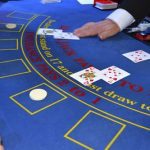
Mindfulness is a mental state of being present and fully engaged in the current moment, without judgment or distraction. In the game of poker, mindfulness can be a powerful tool for improving focus, decision-making, and overall performance. By cultivating mindfulness, players can learn to better manage their emotions, stay calm under pressure, and make more strategic moves at the table. In this article, we will explore the benefits of mindfulness in poker and provide tips for incorporating mindfulness practices into your game.
The Benefits of Practicing Mindfulness in Poker
Poker is a game that requires a lot of focus and concentration. It’s not just about the cards you’re dealt, but also about how you react to them and how you read your opponents. That’s why mindfulness can be a valuable tool for poker players. Here, we’ll explore the benefits of practicing mindfulness in poker and provide some tips for incorporating it into your game.
One of the main benefits of mindfulness in poker is that it helps you stay present in the moment. When you’re playing poker, it’s easy to get caught up in your thoughts about what might happen next or what you should have done differently in the past. But when you’re mindful, you’re able to focus on what’s happening right now. You’re not distracted by your thoughts or emotions, and you’re better able to make decisions based on the information in front of you.
Another benefit of mindfulness in poker is that it helps you manage your emotions. Poker can be a very emotional game, and it’s easy to get frustrated or angry when things don’t go your way. But when you’re mindful, you’re able to observe your emotions without getting caught up in them. You’re able to recognize when you’re feeling frustrated or angry and take steps to calm yourself down before making any rash decisions.
Mindfulness can also help you improve your decision-making skills in poker. When you’re mindful, you’re able to think more clearly and objectively. You’re not influenced by your emotions or biases, and you’re better able to make decisions based on the facts. This can be especially helpful when you’re facing a tough decision and need to weigh the pros and cons of different options.
So how can you incorporate mindfulness into your poker game? One simple technique is to focus on your breath. Take a few deep breaths before each hand and try to stay focused on your breath throughout the game. This can help you stay present in the moment and avoid getting distracted by your thoughts or emotions.
Another technique is to practice visualization. Before each hand, take a few moments to visualize yourself making the right decisions and winning the pot. This can help you stay focused and confident throughout the game.
Finally, it’s important to take breaks and give yourself time to recharge. Poker can be a mentally exhausting game, and it’s important to take care of yourself both physically and mentally. Take breaks when you need them, and make sure to get enough sleep and exercise to keep your mind and body in top shape.
Mindfulness can be a valuable tool for poker players. It can help you stay present in the moment, manage your emotions, and improve your decision-making skills. By incorporating mindfulness techniques into your game, you can become a more focused and confident player. So the next time you sit down at the poker table, take a deep breath, stay present, and trust in your abilities.
5 Tips for Incorporating Mindfulness into Your Poker Game
1. Start with a clear mind
Before you even sit down at the poker table, take a few minutes to clear your mind. Close your eyes and take a few deep breaths. Focus on your breath and let go of any thoughts or distractions. This will help you start the game with a clear and focused mind.
2. Stay present in the moment
During the game, it’s important to stay present in the moment. Don’t get caught up in what happened in the past or what might happen in the future. Focus on the present moment and the cards in front of you. This will help you make better decisions and stay focused on the game.
3. Pay attention to your body
Your body can give you important signals about how you’re feeling. Pay attention to any tension or discomfort in your body. Take a few deep breaths and release any tension. This will help you stay relaxed and focused during the game.
4. Practice non-judgment
It’s easy to get caught up in judgment and criticism during a poker game. You might judge yourself for making a mistake or criticize other players for their decisions. Instead, practice non-judgment. Accept what is happening in the moment without judgment or criticism. This will help you stay focused and make better decisions.
5. Take breaks
Finally, it’s important to take breaks during the game. Take a few minutes to stretch, walk around, or simply take a few deep breaths. This will help you stay refreshed and focused throughout the game.
Incorporating mindfulness into your poker game can have a number of benefits. It can help you stay focused, make better decisions, and stay relaxed and calm during the game. By practicing these five tips, you can start to incorporate mindfulness into your poker game and see the benefits for yourself.
How Mindfulness Can Improve Your Decision-Making in Poker
One of the main benefits of mindfulness in poker is improved focus. When you are fully present in the moment, you are less likely to be distracted by external factors such as noise or other players. This allows you to focus on the game and make more informed decisions.
Another benefit of mindfulness is increased self-awareness. By paying attention to your thoughts and emotions, you can better understand your own tendencies and biases. This can help you make more objective decisions and avoid making decisions based on emotions or past experiences.
To practice mindfulness in poker, start by taking a few deep breaths before each hand. This can help you relax and focus on the present moment. As you play, pay attention to your thoughts and emotions. If you notice yourself becoming distracted or emotional, take a moment to refocus and recenter yourself.
Another tip for practicing mindfulness in poker is to take breaks. If you find yourself becoming overwhelmed or stressed, take a few minutes to step away from the table and clear your mind. This can help you come back to the game with a fresh perspective and renewed focus.
In addition to practicing mindfulness during the game, it is also important to practice mindfulness outside of the game. This can include activities such as meditation, yoga, or simply taking a walk in nature. By incorporating mindfulness into your daily routine, you can improve your overall well-being and mental clarity.
Mindfulness can be a powerful tool for improving decision-making in poker. By practicing mindfulness, players can improve their focus, increase self-awareness, and make more informed decisions. To incorporate mindfulness into your poker game, start by taking a few deep breaths before each hand and paying attention to your thoughts and emotions. Remember to take breaks when needed and practice mindfulness outside of the game as well. With practice, mindfulness can become a valuable asset in your poker strategy.
The Connection Between Mindfulness and Emotional Control in Poker
The connection between mindfulness and emotional control in poker is clear. When you’re playing poker, you’re constantly dealing with emotions like frustration, anxiety, and excitement. These emotions can cloud your judgment and lead you to make impulsive decisions that you’ll regret later. Mindfulness can help you stay calm and centered in the face of these emotions, allowing you to make more rational decisions.
One of the key benefits of mindfulness in poker is that it helps you stay focused on the present moment. When you’re playing poker, it’s easy to get caught up in what happened in the past or what might happen in the future. But by staying focused on the present moment, you can make better decisions based on the information you have right now. Mindfulness can help you tune out distractions and stay focused on the task at hand.
Another benefit of mindfulness in poker is that it can help you manage your tilt. Tilt is a term used to describe the emotional state of a player who has lost control of their emotions and is making irrational decisions. Tilt can be caused by a bad beat, a string of losses, or even just a frustrating opponent. By practicing mindfulness, you can learn to recognize when you’re starting to tilt and take steps to calm yourself down before it’s too late.
So how can you practice mindfulness in poker? One simple technique is to focus on your breath. Take a few deep breaths before each hand and try to stay focused on your breath throughout the hand. This can help you stay centered and calm, even in the face of challenging emotions.
Another technique is to practice visualization. Before a hand, visualize yourself making the best decision possible based on the information you have. This can help you stay focused on the present moment and make better decisions.
Finally, it’s important to take breaks when you need them. If you’re feeling overwhelmed or frustrated, take a few minutes to step away from the table and clear your mind. This can help you come back to the game with a fresh perspective and renewed focus.
Mindfulness can be a valuable tool for poker players looking to improve their emotional control and make better decisions at the table. By staying focused on the present moment, managing your tilt, and taking breaks when you need them, you can become a more mindful and successful poker player. So the next time you sit down at the table, take a deep breath, stay focused, and remember the benefits of mindfulness in poker.
Mindfulness Techniques for Managing Tilt in Poker
One of the key benefits of mindfulness in poker is that it can help you manage tilt. When you’re on tilt, you’re more likely to make impulsive decisions and take unnecessary risks. By practicing mindfulness, you can learn to recognize the signs of tilt and take steps to calm yourself down before it’s too late.
One technique for managing tilt is to take a deep breath and focus on your breath for a few moments. This can help you slow down your racing thoughts and bring your attention back to the present moment. Another technique is to take a break from the game and do something calming, like taking a walk or listening to music. This can help you reset your emotions and come back to the game with a clear head.
Another benefit of mindfulness in poker is that it can help you stay focused and make better decisions. When you’re fully present in the moment, you’re less likely to be distracted by external factors like your opponents’ behavior or the size of the pot. Instead, you can focus on the cards in front of you and make decisions based on logic and strategy.
To practice mindfulness in poker, start by setting an intention for your game. This could be something like “I will stay focused on the present moment” or “I will remain calm and composed, even when things get tough.” Then, throughout the game, check in with yourself regularly to see if you’re staying true to your intention.
Another technique is to use a mindfulness app or guided meditation to help you stay focused and calm. There are many apps available that offer guided meditations specifically designed for poker players. These can help you stay centered and focused, even in the midst of a high-pressure game.
Finally, it’s important to remember that mindfulness is a practice, not a quick fix. It takes time and effort to develop the skills needed to stay present and focused in the midst of a game. But with practice, you can learn to manage your emotions, stay focused, and make better decisions, all of which can lead to greater success at the poker table.
In conclusion, mindfulness is a powerful tool for managing tilt and staying focused in poker. By practicing mindfulness techniques like deep breathing, taking breaks, and setting intentions, you can learn to stay present and make better decisions, even in the midst of a high-pressure game. So the next time you sit down at the poker table, take a moment to center yourself and focus on the present moment. Your game (and your bankroll) will thank you for it.
 Skip to content
Skip to content





